We hope these selections serve to educate and encourage a dialogue around the biases and inequalities that affect access to healthcare and preventative care. These books highlight people and communities affected by these inequalities and the social justice activists and movements working towards change.
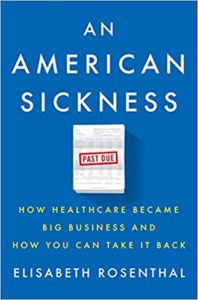 An American Sickness: How Healthcare Became Big Business and How You Can Take It Back by Elisabeth Rosenthal
An American Sickness: How Healthcare Became Big Business and How You Can Take It Back by Elisabeth Rosenthal
“The definitive guide to the past and future of health care in America.” –Siddhartha Mukherjee, Pulitzer Prize-winning author of The Emperor of All Maladies and The Gene At a moment of drastic political upheaval, a shocking investigation into the dangerous, expensive, and dysfunctional American healthcare system, as well as solutions to its myriad of problems In these troubled times, perhaps no institution has unraveled more quickly and more completely than American medicine. In only a few decades, the medical system has been overrun by organizations seeking to exploit for profit the trust that vulnerable and sick Americans place in their healthcare. Our politicians have proven themselves either unwilling or incapable of reining in the increasingly outrageous costs faced by patients, and market-based solutions only seem to funnel larger and larger sums of our money into the hands of corporations. Impossibly high insurance premiums and inexplicably large bills have become facts of life; fatalism has set in. Very quickly Americans have been made to accept paying more for less. How did things get so bad so fast? Breaking down this monolithic business into the individual industries–the hospitals, doctors, insurance companies, and drug manufacturers–that together constitute our healthcare system, Rosenthal exposes the recent evolution of American medicine as never before. How did healthcare, the caring endeavor, become healthcare, the highly profitable industry? Hospital systems, which are managed by business executives, behave like predatory lenders, hounding patients and seizing their homes. Research charities are in bed with big pharmaceutical companies, which surreptitiously profit from the donations made by working people. Patients receive bills in code, from entrepreneurial doctors they never even saw. The system is in tatters, but we can fight back. Dr. Elisabeth Rosenthal doesn’t just explain the symptoms, she diagnoses and treats the disease itself. In clear and practical terms, she spells out exactly how to decode medical doublespeak, avoid the pitfalls of the pharmaceuticals racket, and get the care you and your family deserve. She takes you inside the doctor-patient relationship and to hospital C-suites, explaining step-by-step the workings of a system badly lacking transparency. This is about what we can do, as individual patients, both to navigate the maze that is American healthcare and also to demand far-reaching reform. An American Sickness is the frontline defense against a healthcare system that no longer has our well-being at heart.” – Provided by Publisher
Available Formats: Book, Audiobook, eBook, eAudiobook
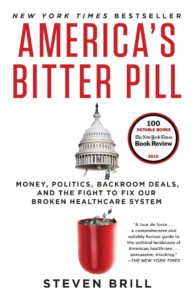 America’s Bitter Pill: Money, Politics, Backroom Deals, and the Fight to Fix Our Broken Healthcare System by Steven Brill
America’s Bitter Pill: Money, Politics, Backroom Deals, and the Fight to Fix Our Broken Healthcare System by Steven Brill
“America’s Bitter Pill is Steven Brill’s much-anticipated, sweeping narrative of how the Affordable Care Act, or Obamacare, was written, how it is being implemented, and, most important, how it is changing–and failing to change–the rampant abuses in the healthcare industry. Brill probed the depths of our nation’s healthcare crisis in his trailblazing Time magazine Special Report, which won the 2014 National Magazine Award for Public Interest. Now he broadens his lens and delves deeper, pulling no punches and taking no prisoners. It’s a fly-on-the-wall account of the fight, amid an onslaught of lobbying, to pass a 961-page law aimed at fixing America’s largest, most dysfunctional industry–an industry larger than the entire economy of France. It’s a penetrating chronicle of how the profiteering that Brill first identified in his Time cover story continues, despite Obamacare. And it is the first complete, inside account of how President Obama persevered to push through the law, but then failed to deal with the staff incompetence and turf wars that crippled its implementation. Brill questions all the participants in the drama, including the president, to find out what happened and why. He asks the head of the agency in charge of the Obamacare website how and why it crashed. And he tells the cliffhanger story of the tech wizards who swooped in to rebuild it. Brill gets drug lobbyists to open up on the deals they struck to protect their profits in return for supporting the law. And he buttresses all these accounts with meticulous research and access to internal memos, emails, notes, and journals written by the key players during all the pivotal moments. Brill is there with patients when they are denied cancer care at a hospital, or charged $77 for a box of gauze pads. Then he asks the multimillion-dollar executives who run the hospitals to explain why. He even confronts the chief executive of America’s largest health insurance company and asks him to explain an incomprehensible Explanation of Benefits his company sent to Brill. And he’s there as a group of young entrepreneurs gamble millions to use Obamacare to start a hip insurance company in New York’s Silicon Alley. Vividly capturing what he calls the “milestone” achievement of Obamacare, Brill introduces us to patients whose bank accounts or lives have been saved by the new law–although, as he explains, that is only because Obamacare provides government subsidies for “tens of millions of new customers” to pay the same exorbitant prices that were the problem in the first place. All that is weaved together in an elegantly crafted, fast-paced narrative. But by chance America’s Bitter Pill ends up being much more–because as Brill was completing this book, he had to undergo urgent open-heart surgery. Thus, this also becomes the story of how one patient who thinks he knows everything about healthcare “policy” rethinks it from a hospital gurney–and combines that insight with his brilliant reporting. The result: a surprising new vision of how we can fix American healthcare so that it stops draining the bank accounts of our families and our businesses, and the federal treasury.” – Provided by Publisher
Available Formats: Book, eBook, eAudiobook
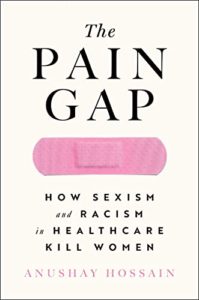 The Pain Gap: How Sexism and Racism in Healthcare Kill Women by Anushay Hossain
The Pain Gap: How Sexism and Racism in Healthcare Kill Women by Anushay Hossain
“Explore real women’s tales of healthcare trauma and medical misogyny with this meticulously researched, in-depth examination of the women’s health crisis in America–and what we can do about it. When Anushay Hossain became pregnant in the US, she was so relieved. Growing up in Bangladesh in the 1980s, where the concept of women’s healthcare hardly existed, she understood how lucky she was to access the best in the world. But she couldn’t have been more wrong. Things started to go awry from the minute she stepped in the hospital, and after thirty hours of labor (two of which she spent pushing), Hossain’s epidural slipped. Her pain was so severe that she ran a fever of 104 degrees, and as she shook and trembled uncontrollably, the doctors finally performed an emergency C-section. Giving birth in the richest country on earth, Hossain never imagined she could die in labor. But she almost did. The experience put her on a journey to explore, understand, and share how women–especially women of color–are dismissed to death by systemic sexism in American healthcare. Following in the footsteps of feminist manifestos such as The Feminine Mystique and Rage Becomes Her , The Pain Gap is an eye-opening and stirring call to arms that encourages women to flip their “hysteria complex” on its head and use it to revolutionize women’s healthcare. This book tells the story of Hossain’s experiences–from growing up in South Asia surrounded by staggering maternal mortality rates to lobbying for global health legislation on Capitol Hill to nearly becoming a statistic herself. Along the way, she realized that a little fury might be just what the doctor ordered. Meticulously researched and deeply reported, this book explores real women’s traumatic experiences with America’s healthcare system–and empowers everyone to use their experiences to bring about the healthcare revolution women need.” – Provided by Publisher
Available Formats: Book
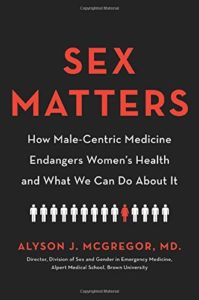 Sex Matters: How Male-Centric Medicine Endangers Women’s Health and What We Can Do About It by Alyson McGregor
Sex Matters: How Male-Centric Medicine Endangers Women’s Health and What We Can Do About It by Alyson McGregor
“Get the right care for your body — and avoid treatments that can endanger women — with this important manual from a physician who is a leading expert on sex and gender medicine. Sex Matters tackles one of the most urgent, yet unspoken issues facing women’s health care today: all models of medical research and practice are based on male-centric models that ignore the unique biological and emotional differences between men and women — an omission that can endanger women’s lives. The facts surrounding how male-centric medicine impacts women’s health every day are chilling: in the ER, women are more likely to receive a psychiatric diagnosis with regard to opioid use, while men are more likely to be referred for detoxification; the more vocal women become about their pain, the more likely their providers are to prescribe either inadequate or inappropriate pain relief medication; women often present with nontraditional symptoms of stroke, which causes delays in recognition by both them and their health professionals; and a government accountability study found that 80% of drugs that are withdrawn from the market are due to side effects that happen to women (a result of testing drugs mostly on men). Leading expert on sex and gender medicine Dr. Alyson McGregor focuses on the key areas where these differences are most potentially harmful, addressing: Cardiac and stroke diagnosis and treatment in women Prescription and dosing of pharmaceuticals; Subjective evaluation of women’s symptoms; Pain and pain management; Hormones and female biochemistry (including prescribed hormones); How economic status, race, and gender identity are additional critical factors. Not only does Dr. McGregor explore these disparities in depth, she shares clear, practical suggestions for what women can do to protect themselves. A work of riveting exposé with revelatory insights and actionable guidance for navigating the medical establishment, Sex Matters is an empowering roadmap for reinventing modern medicine — and for self-care.” – Provided by Publisher
Available Formats: Book
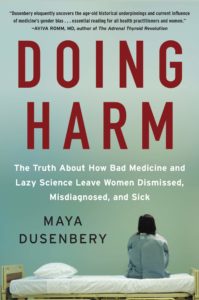 Doing Harm: The Truth About How Bad Medicine and Lazy Science Leave Women Dismissed, Misdiagnosed, and Sick by Maya Dusenbery
Doing Harm: The Truth About How Bad Medicine and Lazy Science Leave Women Dismissed, Misdiagnosed, and Sick by Maya Dusenbery
“Editor of the award-winning site Feministing.com, Maya Dusenbery brings together scientific and sociological research, interviews with doctors and researchers, and personal stories from women across the country to provide the first comprehensive, accessible look at how sexism in medicine harms women today.
In Doing Harm, Dusenbery explores the deep, systemic problems that underlie women’s experiences of feeling dismissed by the medical system. Women have been discharged from the emergency room mid-heart attack with a prescription for anti-anxiety meds, while others with autoimmune diseases have been labeled “chronic complainers” for years before being properly diagnosed. Women with endometriosis have been told they are just overreacting to “normal” menstrual cramps, while still others have “contested” illnesses like chronic fatigue syndrome and fibromyalgia that, dogged by psychosomatic suspicions, have yet to be fully accepted as “real” diseases by the whole of the profession.
An eye-opening read for patients and health care providers alike, Doing Harm shows how women suffer because the medical community knows relatively less about their diseases and bodies and too often doesn’t trust their reports of their symptoms. The research community has neglected conditions that disproportionately affect women and paid little attention to biological differences between the sexes in everything from drug metabolism to the disease factors–even the symptoms of a heart attack. Meanwhile, a long history of viewing women as especially prone to “hysteria” reverberates to the present day, leaving women battling against a stereotype that they’re hypochondriacs whose ailments are likely to be “all in their heads.”
Offering a clear-eyed explanation of the root causes of this insidious and entrenched bias and laying out its sometimes catastrophic consequences, Doing Harm is a rallying wake-up call that will change the way we look at health care for women.” – Provided by Publisher
Available Formats: Book, Audiobook, eBook
 Dying of Whiteness: How the Politics of Racial Resentment Is Killing America’s Heartland by Johnathan Metzl
Dying of Whiteness: How the Politics of Racial Resentment Is Killing America’s Heartland by Johnathan Metzl
“A physician reveals how right-wing backlash policies have mortal consequences — even for the white voters they promise to help Named one of the most anticipated books of 2019 by Esquire and the Boston Globe In the era of Donald Trump, many lower- and middle-class white Americans are drawn to politicians who pledge to make their lives great again. But as Dying of Whiteness shows, the policies that result actually place white Americans at ever-greater risk of sickness and death. Physician Jonathan M. Metzl’s quest to understand the health implications of “backlash governance” leads him across America’s heartland.Interviewing a range of everyday Americans, he examines how racial resentment has fueled progun laws in Missouri, resistance to the Affordable Care Act in Tennessee, and cuts to schools and social services in Kansas. And he shows these policies’ costs: increasing deaths by gun suicide, falling life expectancies, and rising dropout rates. White Americans, Metzl argues, must reject the racial hierarchies that promise to aid them but in fact lead our nation to demise.” – Provided by Publisher
Available Formats: Book, eAudiobook, eBook
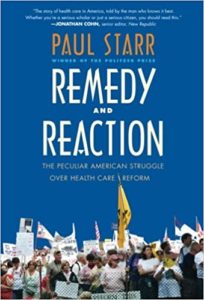 Remedy and Reaction: The Peculiar American Struggle over Health Care Reform by Paul Starr
Remedy and Reaction: The Peculiar American Struggle over Health Care Reform by Paul Starr
“In no other country has health care served as such a volatile flashpoint of ideological conflict. America has endured a century of rancorous debate on health insurance, and despite the passage of legislation in 2010, the battle is not yet over. This book is a history of how and why the United States became so stubbornly different in health care, presented by an expert with unsurpassed knowledge of the issues.
Tracing health-care reform from its beginnings to its current uncertain prospects, Paul Starr argues that the United States ensnared itself in a trap through policies that satisfied enough of the public and so enriched the health-care industry as to make the system difficult to change.
He reveals the inside story of the rise and fall of the Clinton health plan in the early 1990s–and of the Gingrich counterrevolution that followed. And he explains the curious tale of how Mitt Romney’s reforms in Massachusetts became a model for Democrats and then follows both the passage of those reforms under Obama and the explosive reaction they elicited from conservatives. Writing concisely and with an even hand, the author offers exactly what is needed as the debate continues–a penetrating account of how health care became such treacherous terrain in American politics.” – Provided by Publisher
Available Formats: Book
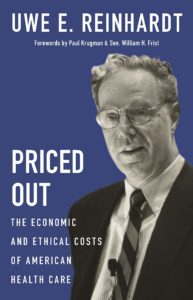 Priced Out: The Economic and Ethical Costs of American Health Care by Uwe E Reinhardt
Priced Out: The Economic and Ethical Costs of American Health Care by Uwe E Reinhardt
“From a giant of health care policy, an engaging and enlightening account of why American health care is so expensive–and why it doesn’t have to be Uwe Reinhardt was a towering figure and moral conscience of health care policy in the United States and beyond. Famously bipartisan, he advised presidents and Congress on health reform and originated central features of the Affordable Care Act. In Priced Out , Reinhardt offers an engaging and enlightening account of today’s U.S. health care system, explaining why it costs so much more and delivers so much less than the systems of every other advanced country, why this situation is morally indefensible, and how we might improve it. The problem, Reinhardt says, is not one of economics but of social ethics. There is no American political consensus on a fundamental question other countries settled long ago: to what extent should we be our brothers’ and sisters’ keepers when it comes to health care? Drawing on the best evidence, he guides readers through the chaotic, secretive, and inefficient way America finances health care, and he offers a penetrating ethical analysis of recent reform proposals. At this point, he argues, the United States appears to have three stark choices: the government can make the rich help pay for the health care of the poor, ration care by income, or control costs. Reinhardt proposes an alternative path: that by age 26 all Americans must choose either to join an insurance arrangement with community-rated premiums, or take a chance on being uninsured or relying on a health insurance market that charges premiums based on health status. An incisive look at the American health care system, Priced Out dispels the confusion, ignorance, myths, and misinformation that hinder effective reform.” – Provided by Publisher
Available Formats: Book, eAudiobook, eBook
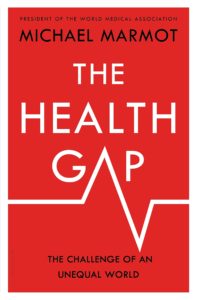 The Health Gap: The Challenge of an Unequal World by Michael Marmot
The Health Gap: The Challenge of an Unequal World by Michael Marmot
“In this groundbreaking book, Michael Marmot, president of the World Medical Association, reveals social injustice to be the greatest threat to global health In Baltimore’s inner-city neighborhood of Upton/Druid Heights, a man’s life expectancy is sixty-three; not far away, in the Greater Roland Park/Poplar neighborhood, life expectancy is eighty-three. The same twenty-year avoidable disparity exists in the Calton and Lenzie neighborhoods of Glasgow, and in other cities around the world. In Sierra Leone, one in 21 fifteen-year-old women will die in her fertile years of a maternal-related cause; in Italy, the figure is one in 17,100; but in the United States, which spends more on healthcare than any other country in the world, it is one in 1,800 (and now, with the new administration chipping away at Obamacare, the statistics stand to grow even more devastating). Why? Dramatic differences in health are not a simple matter of rich and poor; poverty alone doesn’t drive ill health, but inequality does. Indeed, suicide, heart disease, lung disease, obesity, and diabetes, for example, are all linked to social disadvantage. In every country, people at relative social disadvantage suffer health disadvantage and shorter lives. Within countries, the higher the social status of individuals, the better their health. These health inequalities defy the usual explanations. Conventional approaches to improving health have emphasized access to technical solutions and changes in the behavior of individuals, but these methods only go so far. What really makes a difference is creating the conditions for people to have control over their lives, to have the power to live as they want. Empowerment is the key to reducing health inequality and thereby improving the health of everyone. Marmot emphasizes that the rate of illness of a society as a whole determines how well it functions; the greater the health inequity, the greater the dysfunction. Marmot underscores that we have the tools and resources materially to improve levels of health for individuals and societies around the world, and that to not do so would be a form of injustice. Citing powerful examples and startling statistics (“young men in the U.S. have less chance of surviving to sixty than young men in forty-nine other countries”), The Health Gap presents compelling evidence for a radical change in the way we think about health and indeed society, and inspires us to address the societal imbalances in power, money, and resources that work against health equity.” – Provided by Publisher
Available Formats: Book
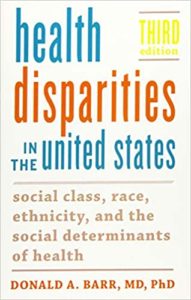 Health Disparities in the United States: Social Class, Race, Ethnicity, and the Social Determinants of Health by Donald A Barr
Health Disparities in the United States: Social Class, Race, Ethnicity, and the Social Determinants of Health by Donald A Barr
“Challenging students to think critically about the complex web of social forces that leads to health disparities in the United States.
The health care system in the United States has been called the best in the world. Yet wide disparities persist between social groups, and many Americans suffer from poorer health than people in other developed countries. In this revised edition of Health Disparities in the United States , Donald A. Barr provides extensive new data about the ways low socioeconomic status, race, and ethnicity interact to create and perpetuate these health disparities. Examining the significance of this gulf for the medical community and society at large, Barr offers potential policy- and physician-based solutions for reducing health inequity in the long term.
This thoroughly updated edition focuses on a new challenge the United States last experienced more than half a century ago: successive years of declining life expectancy. Barr addresses the causes of this decline, including what are commonly referred to as “deaths of despair”–from opiate overdose or suicide. Exploring the growing role geography plays in health disparities, Barr asks why people living in rural areas suffer the greatest increases in these deaths. He also analyzes recent changes under the Affordable Care Act and considers the literature on how race and ethnicity affect the way health care providers evaluate and treat patients.
As both a physician and a sociologist, Barr is uniquely positioned to offer rigorous medical explanations alongside sociological analysis. An essential text for courses in public health, health policy, and sociology, this compelling book is a vital teaching tool and a comprehensive reference for social science and medical professionals.” – Provided by Publisher
Available Formats: Book
We love helping people find books, movies, and more.
Tell us about your preferences, and our librarians will create a list of titles selected specifically for you.